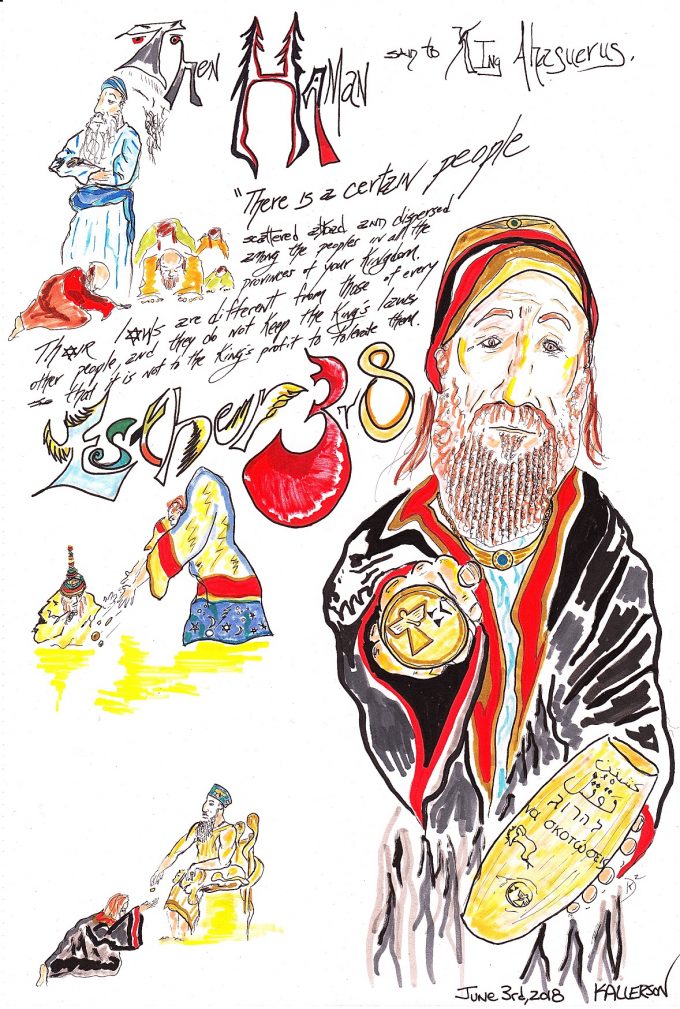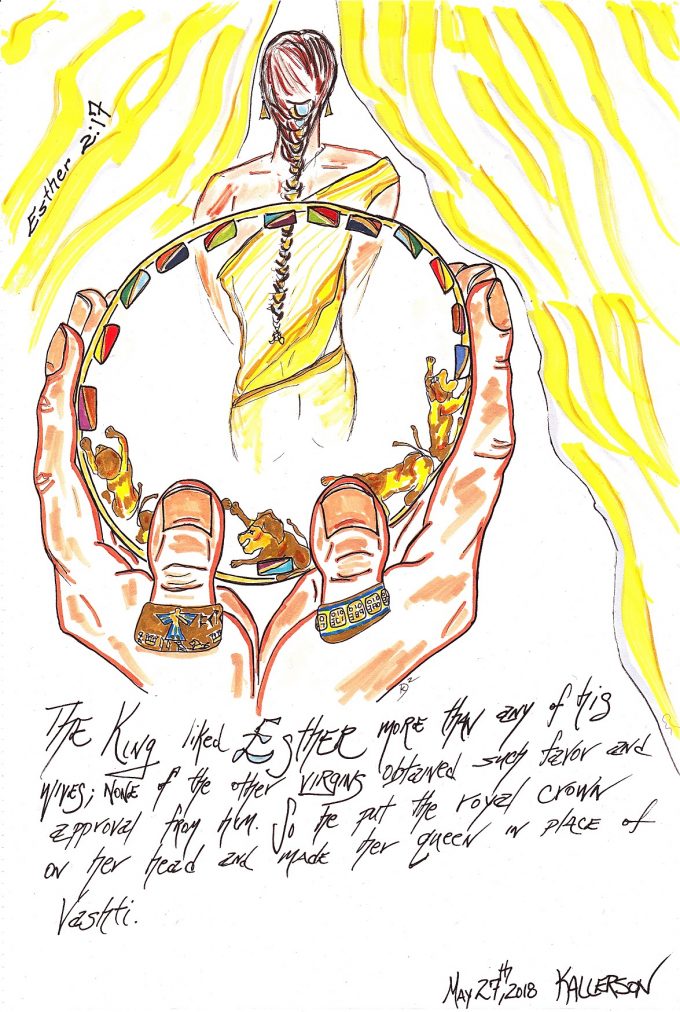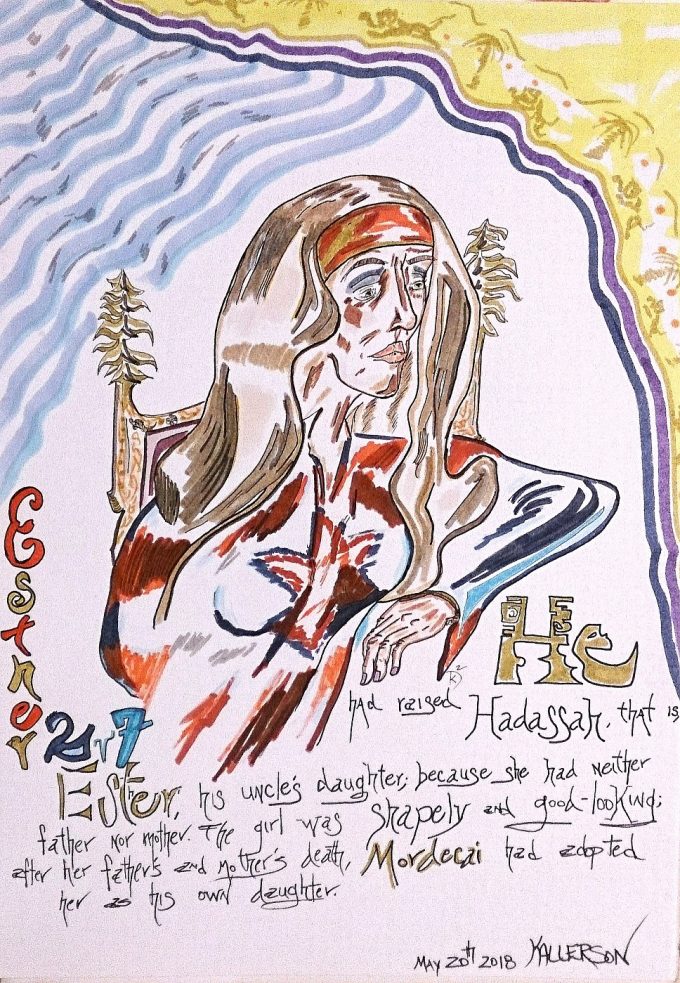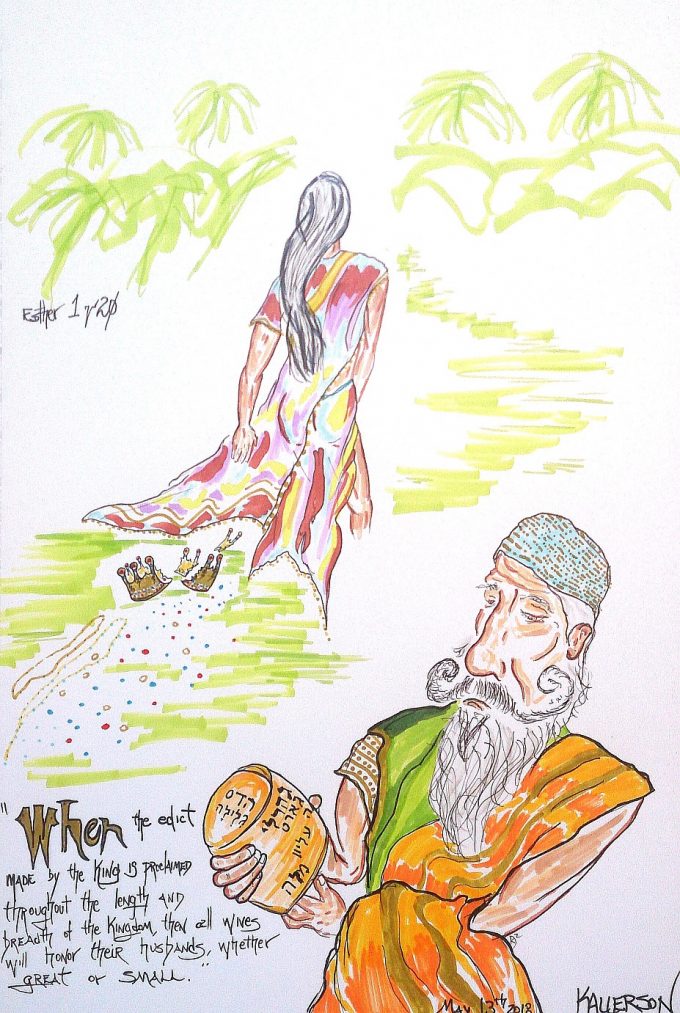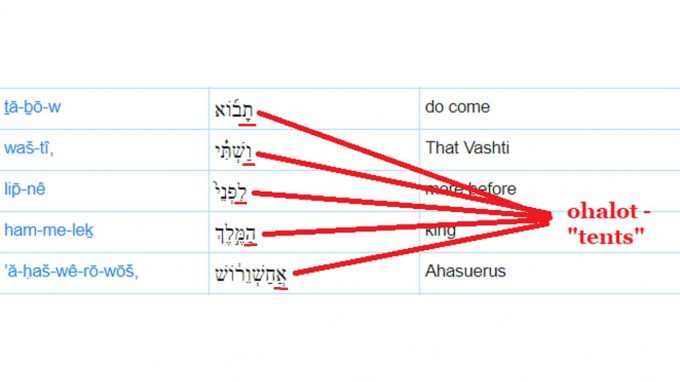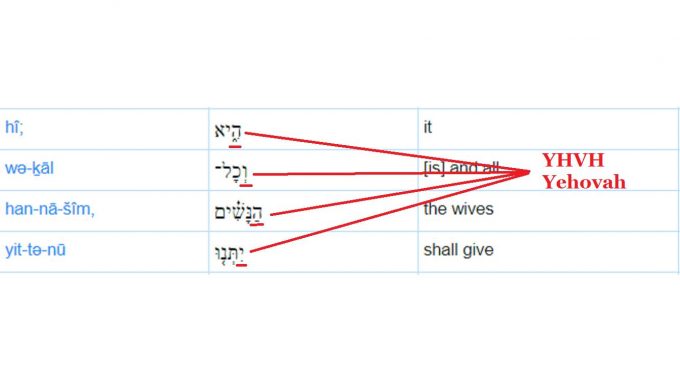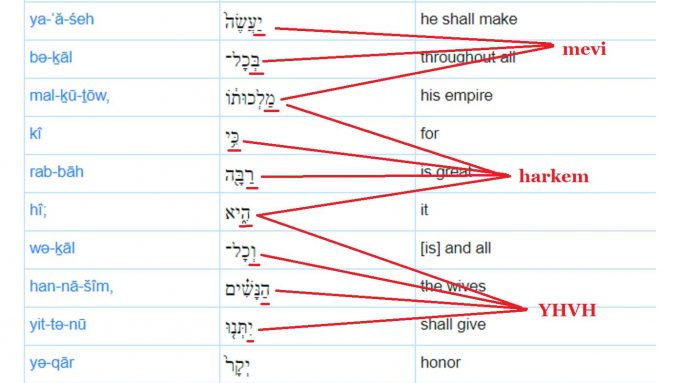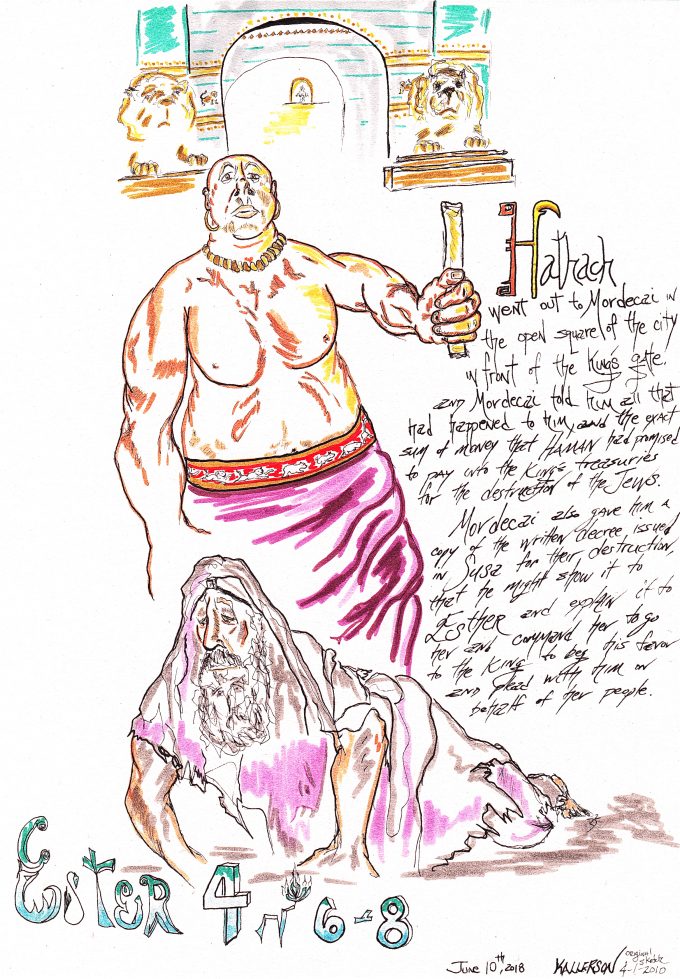
Esther 4:1-17
Unseen and Unacknowledged
One of the sub-disciplines of systematic theology is known as Theology Proper. This deals specifically with the being, attributes, and works of God. In the Trinitarian model, which true Christians hold to, this study includes pneumatology (the study of the Holy Spirit) and Christology (the study of Jesus Christ).
Concerning God, it is said that no one can see God. God is Spirit. However, though God is unseen, we also know that God is omnipresent. It is rather hard to imagine that God is everywhere, and yet we cannot see Him. But the two are not contradictory at all. As God is Spirit, then He can be everywhere, at all times, and still be unseen. He is of a completely different nature than we are. And yet, though He is unseen, His effects are not.
In creation, we can see and experience all the things that God has created… out of nothing. They are the evidence that God is. But evidences of God are not limited to the physical things we can see. They are also realized in how things come out. The process may be unseen, but the results are not. If we just pay attention to times and circumstances, we can in fact see the evidences of God in those things.
Israel is a perfect example of this. By all logical processes of thought, they should not even exist anymore. But not only do they exist, they exist exactly as Scripture said they would – as a people, with the language they speak, in the times things happen to them, in the places they happen, and in the results of where they are in connection to their surroundings.
All of these things show us evidences of God, being worked out in our world. We can ascribe to these things time and chance, or we can take them as God has intended for us to take them, and see that He is there, doing what He is doing, for our benefit and hopefully for our choosing to seek Him out. This is what faith is. This is what is pleasing to God. As far as God being unseen, this is how James describes Him in our text verse for today –
Text Verse: “Every good gift and every perfect gift is from above, and comes down from the Father of lights, with whom there is no variation or shadow of turning.” James 1:17
The word James uses for “variation” is parallagē. It is a word unique in all of Scripture. James reached into the world of the scientific realm to attempt to reveal to us what God is like. The word indicates a parallax. A parallax is where an object appears to differ when viewed from different positions. It can be through the viewfinder on a camera, or it can be where you stand looking at a star from different points on the earth’s orbit.
But if you look at a star from even a millionth of an inch different than another spot, there will be a change, no matter how small it may appear. Nothing can truly be viewed in the same manner except in the exact same spot. However, God can be spiritually viewed from anywhere, at any time, and by any set of eyes… and He will never be different. If we all could look at an atom in the middle of this room, we would all see the atom and yet, we would all be seeing the atom from a different perspective. But when we look to God, we look to that which is completely unchanging.
Why is this important to know? Because God may be hidden from our eyes, but He is there, and He is without any change at all. When He speaks, it is a reflection of who He is. And thus His word IS. We cannot find anything other than the unchanging God in His word. Why is this important to know? Because His word before the book of Esther is confirmed in Esther. And Esther deals with Israel of the past, but God is still dealing with Israel of the present in the same manner. Well, unless you are a reformed theologian, a Mormon, a Jehovah’s Witness, or one of many other groups. Then He is supposedly dealing with them differently, and you are sitting in the wrong church.
And why is this important to know? Because the Lord is missing in Esther, and yet His presence is seen nonetheless. The question is, are you looking for the Lord where He is not to be seen? You should be. But at the same time, you need to not insert the Lord where He is not acknowledged. What does that mean? Keep listening, and we will get to that.
The Lord is there. Just remember that for now. He is there, and He is tending to His word in Chapter 4 of Esther. It’s all to be found in His superior word. And so let’s turn to that precious word once again and… May God speak to us through His word today and may His glorious name ever be praised.
I. A Time to Mourn (verses 1-9)
When Mordecai learned all that had happened, he tore his clothes
The words here take us back to the events of Chapter 3. Haman had plotted against the Jews, and King Ahasuerus had agreed to his scheme. A date for the destruction of the Jews was chosen, a decree was published, and the kingdom was made aware of what that decree contained. In learning of this, and of the behind-the-scenes details as verse 4:7 will show us, Mordecai then takes several very middle-eastern, and more specifically, very Jewish actions. In them, he identified himself openly and publicly as a Jew. He is said first to have torn his clothes.
This is a sign of great distress. A person’s clothes are their outer protection, they are a covering of one’s nakedness, they serve as an adornment, and so on. In tearing one’s clothes, it is a rejection of each of these things in some measure. One’s vulnerability is revealed, one’s nakedness is exposed, and the adornment that was delighted in is rejected. The first time this was seen in Scripture was when Reuben found that Joseph was no longer in the pit that he and his brothers had cast him into. From there, this sign of great distress is seen again and again throughout the Bible. Next…
1 (con’t) and put on sackcloth and ashes,
Sackcloth and ashes, as an external adornment, signifies extreme mourning. Instead of one’s regular clothes, one would put on this coarse material made from hair which was used for sacks. The poor quality of the cloth would be itchy and unsightly. The garments would be both a physical reminder to the body, and to the eyes, of great mourning. It speaks of a state of humility, not arrogance, before God and man.
Ashes add in a second element to the state of mourning. Sitting in or wearing ashes implies that being reduced to ashes is one’s just due. It is, in essence a petition for mercy. “I understand what I deserve, the fiery judgment of God, and I acknowledge that. Thine will be done.” These external actions of of Mordecai are the greatest acts of humility that he could perform. From there…
1 (con’t) and went out into the midst of the city.
One can sit in ashes, as the king of Nineveh did in Jonah; one can also roll in ashes as is noted in Jeremiah 6:26; or one can lay in them as will be seen in the next verse here in Esther. In Mordecai’s case, he put on sackcloth and ashes and then went out into the midst of the city. This was to make his state known to all. Being covered in this way it would be a sign to all that great distress filled his soul. From there, others would hear and follow suit as…
1 (con’t) He cried out with a loud and bitter cry.
The words here are exceedingly similar to those found in Genesis 27:34. After Jacob stole Esau’s blessing through deception, Esau went into his father to obtain the blessing he was promised. However, when it was discovered what had happened, we read –
“When Esau heard the words of his father, he cried with an exceedingly great and bitter cry, and said to his father, ‘Bless me—me also, O my father!’”
There is only a very small change in the words between there and here, from zaaq to tsaaq. The verses are essentially identical. The only difference is the use of the letter zayin in place of a tsadde. The symbolism, then, shouldn’t be missed. Esau was a hairy man who cried out in distress. Mordecai is covered in a hairy garment, crying out in distress. Esau, picturing Adam, had lost his blessing. Mordecai takes on the same picture – representative of Israel having lost their blessing, now facing a curse.
What is obvious however, is what it missing from this external display of mourning. Garments are torn, sackcloth and ashes are put on, and there is great wailing – all external signs – but there is no note of an internal turning to God through prayer and supplication. When priests and prophets such as Daniel, Ezekiel, and Ezra faced such trials, they are shown to have revealed their anguish both externally and through prayer and supplication. Whether Mordecai prayed or not, the Bible specifically maintains silence on the issue. Only the externals are noted here.
The Greek translation of the Old Testament adds at the end of this verse the words Airetai ethnos meden edikekos – “A people are going to be destroyed who have done no evil.” The additions to the Greek translation, of which there are others, do not appear to reflect the intent of the original at all. In fact, they harm the integrity of what the story is actually conveying. If Israel had done no evil, they would not have been sent into exile.
2 He went as far as the front of the king’s gate, for no one might enter the king’s gate clothed with sackcloth.
The words reveal that a law must have existed which precluded anyone in mourning from entering near the king. This can also be inferred from Nehemiah’s words. He was sad in the presence of the king, and when the king asked about it, it says that Nehemiah became dreadfully afraid. From these verses, it can be deduced that no mourning was to be displayed before the Persian kings.
Understanding this, we can see that Mordecai could not enter, or even sit in, the king’s gate. Instead, he only went to the front of it. This would be as near as he could get in hopes of contacting Esther and relaying to her his message and hopes.
3 And in every province where the king’s command and decree arrived, there was great mourning among the Jews, with fasting, weeping, and wailing; and many lay in sackcloth and ashes.
As the decree arrived and was posted throughout the provinces, the Jews followed the same pattern as Mordecai. They mourned, fasted, wept, and lamented, employing the same traditional signs of mourning. Here a new word is introduced, yatsa, to lay or spread. It will be seen only four times. It gives the sense of spreading out sackcloth and ashes as a bed to lie in. Still, there is no sign of praying to, or petitioning of, God in any of these words. The Lord is not mentioned at all. The words are purposeful. He may be there behind the scenes, but the word shows that it is self, and not God, who is the focus of the narrative.
This verse now introduces two sets of two’s. First, there is fasting noted here, and then it will be seen again in verse 16. This is voluntary, but in distress. It is throughout the Jewish people, and it is in response to the king’s troubling decree. The next will be mandated, but in hope. It is in Shushan alone, and it is at the queen’s command, and for the queen’s sake. Together they contrast, and yet they confirm fasting as a source of national identification of the Jews through this ancient rite.
The second set of two’s concerns the attitude of the Jews after the giving of an edict. In this one, there is great mourning, fasting, weeping, and wailing, and many laying in sackcloth and ashes. In Chapter 8, after the next edict, there will be joy, gladness, honor, a feast, and a holiday. The two contrast, yes, but they also confirm the unity of the people in both distress and in exultation.
4 So Esther’s maids and eunuchs came and told her, and the queen was deeply distressed.
It was already known to the royal court, as was seen in verse 2:11, that Mordecai had cared for Esther. It may be that all knew he raised her after her parents died, but didn’t realize that she was related to him by blood. Or, those who attended to her may have known this, though it wasn’t yet widely disseminated. No matter what though, they knew of the relationship between the two and when they saw Mordecai’s distress, they passed this on to her.
When she heard this, it says that she was “deeply distressed.” The Hebrew word is in a passive intensive form, showing that this really troubled her immensely. It can be assumed then that Mordecai was otherwise an upbeat, amiable guy. But something had destroyed his normal demeanor. His misery now became hers.
4 (con’t) Then she sent garments to clothe Mordecai and take his sackcloth away from him, but he would not accept them.
The reason for doing this is so that he would then be allowed into the gate. Once there, she then could meet him and find out what the problem was. But even this heartfelt invitation was rejected. This would then demonstrate to her the immense grief that he was facing. So much so that he was unwilling to take off his mourning clothes to let her know what had come about.
5 Then Esther called Hathach, one of the king’s eunuchs whom he had appointed to attend her, and she gave him a command concerning Mordecai, to learn what and why this was.
It is said that one of the king’s personal eunuch’s would be assigned to the queen. He would normally be an older man, of the highest reputation, and who had faithfully served. As her personal attendant, he would be the most logical choice to speak to Mordecai. He would be faithful to find out, and faithful to repeat exactingly what he had learned.
6 So Hathach went out to Mordecai in the city square that was in front of the king’s gate.
If your translation says “street” instead of “city square,” don’t panic. The word rekhov can mean either. It comes from a verb meaning “to widen.” Thus Mordecai is in a broad place before the king’s gate. It would be a place where many people passed, and so he is there making his mourning public. It is to this place that Hathach comes to find him.
7 And Mordecai told him all that had happened to him,
This is Mordecai’s way of showing that what occurred to all of the Jews was a decision based solely on the actions of one Jew. “All that happened to him” then is referring to verses 3:1-3:6 where Mordecai refused to rise for Haman, and which culminated in the words, “But he disdained to lay hands on Mordecai alone, for they had told him of the people of Mordecai. Instead, Haman sought to destroy all the Jews who were throughout the whole kingdom of Ahasuerus—the people of Mordecai” (3:6). To support this, he then tells what more he learned of the matter with…
7 (con’t) and the sum of money that Haman had promised to pay into the king’s treasuries to destroy the Jews.
In passing this information on, it was intended to show how great was Haman’s resentment at Mordecai’s actions and the eagerness that then resulted in destroying all the Jews. In other words, it is to demonstrate that Haman wasn’t just a narcissist, but that he was truly mentally unbalanced. If he was merely narcissistic, he would have had Mordecai alone punished – probably in a public and disgraceful way. But what has arisen shows the actions of a madman.
As side note, the word translated as “sum” is parashah. It will be used only here and in Esther 10:2 in the Bible. It signifies an exact amount, or a portion. Nowadays, it refers to a section of a biblical book, somewhat like our chapter divisions in the Bible. The parashah forms the basis for reading of Scripture in Jewish synagogues.
8 He also gave him a copy of the written decree for their destruction, which was given at Shushan,
A written copy, or at least a written note with the substance of the decree, would validate his words, it would show the timing of the events to come, and it would convey to her that Haman’s plan wasn’t just a hopeful wish, but a now-issued decree which bore the king’s approval.
8 (con’t) that he might show it to Esther and explain it to her, and that he might command her to go in to the king to make supplication to him and plead before him for her people.
It has been noted that the Hebrew of these words is exceedingly strong. There is an urgency in accomplishing the task, and so whether Mordecai is either commanding her as his adopted daughter, or charging her as a member of the Jewish people, he is now asking her to reveal her nationality to the king. She is of the same people as those who are set for destruction, and so her petition to the king is to be based on that premise.
The Greek translation of this verse adds in the following long sentence which is not supported by any other text, nor is it supported by the tenor of the book of Esther as well –
“Remember the time of your low estate, and in what manner you have been nourished, and carried in my arms; and that Haman, who is next to the king, has got a decree for our destruction. Pray, therefore, to the Lord, and plead with the king, that we may be delivered from death.”
The theme of Esther is that of the Lord being unacknowledged by the people, and yet still working in the background for them. The addition of these words in the Greek is surely a later fabrication.
9 So Hathach returned and told Esther the words of Mordecai.
Now Esther has an understanding of the basis for Mordecai’s lamentation, and she has all of the background information as well. It would be sufficient for her to grasp the magnitude of the situation, and to act in accord with Mordecai’s pleas. However, instead of doing as charged, she follows another path…
Woe to us for we have been sold to destruction
Our hope is gone and we have met our end
The empire will complete the king’s instruction
Death to our people, the royal decree does send
Our hope is lost; our life is dried up
There is nothing but sadness till we meet our end
No water for our lips, no wine in our cup
Death to our people, the royal decree does send
If there is hope, from where will it come?
It feels as if we as a people have finally met our end
If there is hope, we need only a crumb
Or death is assured, since the royal decree is penned
II. A Time Such as This (verses 10-17)
10 Then Esther spoke to Hathach, and gave him a command for Mordecai:
The word “command” here is for Hathach to transfer her words to Mordecai, not for him to transfer a command to him. As far as Hathach, he entered the narrative in verse 5. Now he is mentioned here for the last time in the Bible. So long Hathach.
11 “All the king’s servants and the people of the king’s provinces know that any man or woman who goes into the inner court to the king, who has not been called, he has but one law: put all to death, except the one to whom the king holds out the golden scepter, that he may live.
A law already in place, and fully known to all people, was that no person could ever enter into the inner court where the king sat without being called. This could be in response to a request, approving it and allowing entrance, or it could be from the throne commanding someone to be brought in. Either way, the approval had to come from the throne. Anyone who entered without approval was given one law – death. However, the king could hold out his scepter to the condemned person, granting pardon for the illegal intrusion. Two words found in this verse are unique to the book of Esther – yashat, or hold out, and sharvit, or scepter. They will be used in three verses of Esther and nowhere else.
11 (con’t) Yet I myself have not been called to go in to the king these thirty days.”
Even the queen fell under the law of entry, and she had not been summoned for a full month. She, therefore, may have felt that the king was no longer interested in her. If she petitioned to the king to enter, he may deny her request. If this was the case, then she could not, under any circumstance, come forward and expect to live. However, if she petitioned him to enter and he approved, then she would be compelled to explain herself immediately, even if Haman was present.
Either way, going forward based on a request would possibly be ineffective in resolving the matter. But going in without being requested would potentially be suicidal. The amount of time that had gone by made this a definite possibility. However, the number thirty in Scripture signifies “in a higher degree the perfection of Divine order, as marking the right moment” (EW Bullinger). Rather than being an inopportune time, it is the perfect time to begin a process to bring about a change in the direction of events.
12 So they told Mordecai Esther’s words.
v’yagidu l’maredokay eth divre esther – “And they told to Mordecai words Esther.” The only logical question for me, and which I now ask of you, concerning this is, “Who are ‘they?’” Hathach is the only person who has been mentioned and spoken to since verse 5. In verse 10, Esther spoke to him again to give a command for Mordecai. The Hebrew is 3rd person, masculine, plural. Hathach disappears from the narrative, and in comes a plural verb. Whoever “they” are, they passed on her words to Mordecai.
13 And Mordecai told them to answer Esther: “Do not think in your heart that you will escape in the king’s palace any more than all the other Jews.
There is no “them” in this verse. That is inserted. It simply says, “Then said Mordecai to answer unto Esther.” It makes the “they” in the previous verse that much more perplexing. Despite this puzzling linguistic difficulty, Mordecai’s words are somber indeed. It may be that he suspected Haman knew Esther’s nationality. Whether this is the case or not, the servants, including Hathach now did. With her identity known, it could not be withheld from the king’s knowledge without jeopardizing their own lives. Therefore, she would not escape, even being in the king’s palace, and even being the queen. She was Jewish and her position could no longer protect her.
14 For if you remain completely silent at this time, relief and deliverance will arise for the Jews from another place,
Almost every scholar who comments on these words attributes the words of Mordecai to a strong faith in the belief that God will personally interpose and ensure that things will come out right. This is entirely incorrect. If he believed this, he would have said it, or the author would have stated it for him. But both God, and the Lord, are completely left out of the book – highlighting the fact that He is not on their minds at all.
A knowledge of God’s presence cannot be assumed or inserted into the narrative. It can only be assumed by the reader of the narrative. It is the reader’s job to see that God, despite having been rejected by the Jews, has not rejected them. This takes us back to Leviticus 26 where the Lord stated this –
“Yet for all that, when they are in the land of their enemies, I will not cast them away, nor shall I abhor them, to utterly destroy them and break My covenant with them;
for I am the Lord their God.
45 But for their sake I will remember the covenant of their ancestors, whom I brought out of the land of Egypt in the sight of the nations, that I might be their God:
I am the Lord.” Leviticus 26:44, 45
It is for the sake of the covenant to Abraham, Isaac, and Jacob that the Lord made this statement. Though the people are dispersed because of their rejection of Him, including remaining in dispersion voluntarily, He is working to preserve the Jews according to His word to the patriarchs.
Whether Mordecai even knew of this promise at all or not cannot be determined. But as a Jew, he knew that his people would find deliverance in some way. This is the same thought of secular Jews to this day. They are sure they will stand as a people, it is practically a national motto. But they do not attribute this to God. Rather, they attribute it to their own ability to preserve their heritage and culture. It is not the Lord, but their Jewishness which continues to drive their overall ideology as a people.
In the words of this clause are two very rare words. The first, revakh, is translated as “relief.” It was seen in Genesis 32:16, translated as “distance.” With a distance, one has an interval, and thus respite or relief. It carries the idea of a breathing space. There, it was used as a picture of an interval between the dispensations of time in redemptive history. Now it is seen for the second and last time. The second word is found only here in the Bible, hatstsalah, or deliverance. Mordecai is trusting in deliverance, but he is not trusting in the Deliverer. Time and chance alone are on his mind.
14 (con’t) but you and your father’s house will perish.
The words here strongly suggest that Mordecai was certain Haman knew of the Jewish ancestry of Esther, or that at least Esther’s ancestry – previously revealed to Hathach and others – would be her demise. She would not escape, and her father’s house – meaning his line – would perish with her.
14 (con’t) Yet who knows whether you have come to the kingdom for such a time as this?”
Again, these words cannot be attributed to the workings of the Lord. They are words of time, chance, luck, and fortune. If Mordecai accepted the Lord’s divine hand of Jewish protection, he would have stated it – clearly and unambiguously – just as King David did numerous times in his life, such as in Psalm 18 –
“I will love You, O Lord, my strength.
2 The Lord is my rock and my fortress and my deliverer;
My God, my strength, in whom I will trust;
My shield and the horn of my salvation, my stronghold.
3 I will call upon the Lord, who is worthy to be praised;
So shall I be saved from my enemies.” Psalm 18:1-3
David knew the Lord, he loved the Lord, he trusted the Lord, and he called out to the Lord. This is left entirely out of the words of Mordecai. As words reflect the man, so Mordecai trusted, but not in the Lord. And yet, the Lord included this book in His word to demonstrate that He, while being neglected by His people, remained faithful to them.
When the world looks at Israel today, and while the Jews of today continue to trust in their own might and prowess, the Lord sits unchanged in His being, and thus unchanged in His promises to the patriarchs. Israel will stand because of the word of Lord, and because of that alone.
Despite the attitude presented, the words of this clause are as hopeful as any found in Scripture. They are memorable simply for the truth that they reveal, umi yodea im l’eth kazot higaat la’malkut “and who knows whether for a time as this you have come to the kingdom.” Mordecai sees an opportunity, and he sees that it is about as good as any could ever get. Esther may die coming before the king, or she may be the means by which they are saved, but the opportunity outweighs the risk on all levels. As John Gill states it, “It is better to perish in a good cause than in a bad one.”
15 Then Esther told them to reply to Mordecai:
Again, “them” is inserted here. It simply says, “And said Esther to return unto Mordecai.” Who “them” is goes unstated, but them folks, whoever them might be, sure make a great mystery.
16 “Go, gather all the Jews who are present in Shushan, and fast for me;
Esther’s reply of verse 16 is one of resigned submission. Her words are first for the Jews of Shushan to hold a fast. However, unlike many other fasts in the Bible, this one says nothing about it being to the Lord, or to God. On other occasions when fasting is noted, the same verse, or the context of the verse often includes God as the object of the fast. This is seen, for example, in Ezra 8:23 –
“So we fasted and entreated our God for this, and He answered our prayer.”
Here, the object is Esther – “fast for me.” Again, scholars force God into this verse, stating that He is the object of the petition, and that He is the One for whom the fast is made. This cannot be assumed. In Zechariah 7, we read –
“Say to all the people of the land, and to the priests: ‘When you fasted and mourned in the fifth and seventh months during those seventy years, did you really fast for Me—for Me? 6 When you eat and when you drink, do you not eat and drink for yourselves? 7 Should you not have obeyed the words which the Lord proclaimed through the former prophets when Jerusalem and the cities around it were inhabited and prosperous, and the South and the Lowland were inhabited?’” Zechariah 7:5-7
When Jesus spoke to the leaders of Israel in Matthew 6, He corrected them on misdirected fasting as well. People all over the world fast, for a multitude of reasons, and few of them are directed at petitioning God. It very well may be that His divine intervention is what they are seeking, but the author does not indicate it, and the words of Esther do not either. The words leave the Lord out entirely. We cannot place Him there after the fact.
16 (con’t) neither eat nor drink for three days, night or day.
The words here are helpful to understanding what the term, “three days, night or day,” means. Jesus uses similar terminology in Matthew 12 concerning His time in the grave. And yet, the timeline for His crucifixion and resurrection is a total of three days – from Friday to Sunday. This is later confirmed thirteen times when it says that He rose “on the third day.” Such is the case here as well. In Esther 5:1, we will read the words, v’hi b’yom ha’shelishi, “Now it happened on the third day…” Thus, the time-frame here, and in Matthew, means three days, up to the third day.
16 (con’t)My maids and I will fast likewise.
These words show that the fast was one for Esther, not to the Lord. Her maids are not Jewish. If they were, it would indicate this. Instead, she is asking for a fast as a sign of solidarity with her people and among those she is in charge of. This is similar to what Jephthah’s daughter asked for prior to her death –
“Then she said to her father, “Let this thing be done for me: let me alone for two months, that I may go and wander on the mountains and bewail my virginity, my friends and I.” Judges 11:37
These words close out the set of two’s concerning two fasts being held. The first was voluntary, but in distress. It was throughout the Jewish people, and it was in response to the king’s troubling decree. This one is mandated, but in hope. It is in Shushan alone, and it is at the queen’s command, and for the queen’s sake. Together they contrast, and yet they confirm fasting as a source of national identification.
16 (con’t)And so I will go to the king, which is against the law;
After the sign of solidarity and identification is complete, Esther will be encouraged enough to enter the king’s presence without first asking, or being requested, and without first being approved. It may mean her death, but it is the only logical way to conduct what needs to be done.
16 (con’t) and if I perish, I perish!”
Her words are not words of faith. When faced with the fiery furnace, Daniel’s three friends did acknowledge that they might die, but before doing so, they acknowledge, in faith, that the Lord would deliver them –
“Shadrach, Meshach, and Abed-Nego answered and said to the king, ‘O Nebuchadnezzar, we have no need to answer you in this matter. 17 If that is the case, our God whom we serve is able to deliver us from the burning fiery furnace, and He will deliver us from your hand, O king. 18 But if not, let it be known to you, O king, that we do not serve your gods, nor will we worship the gold image which you have set up.’” Daniel 3:16-18
The story of Esther is about the Lord, but it is not about the Lord being the object and adoration of the people. It is about the Lord being faithful to a people who have failed to acknowledge Him. They are to be saved despite themselves. They were given the chance to return to Him, and they did not. They remained in exile. By not acknowledging Him in their words and actions in Esther 4, they are profaning Him. There can be no other way of looking at this without abusing what is presented. Thus, what is going to occur in the pages ahead is reflective of the words of Ezekiel 36 –
“When they came to the nations, wherever they went, they profaned My holy name—when they said of them, ‘These are the people of the Lord, and yet they have gone out of His land.’ 21 But I had concern for My holy name, which the house of Israel had profaned among the nations wherever they went.” Ezekiel 36:20-21
*17 So Mordecai went his way and did according to all that Esther commanded him.
The chapter, though 17 verses long, has gone quickly. The words of quite a few of the verses are generally easy to follow, simple, and without a lot of explanation. Such is the case with this final verse. Mordecai felt that the agreement was sufficient and reasonable. From this point, he would pass the information on, and trust that things might turn out as they should.
Again, it must be stressed that forcing the Lord into the verses of this chapter – although it is that which is almost universally done by scholars – is wholly inappropriate. The words of Mordecai and Esther are completely void of any acknowledgment of the Lord at all, as are the words of the author, who could have supplied them. This often happens elsewhere, such as “But David strengthened himself in the Lord his God” (1 Samuel 30:6). The author notes what is occurring inside of David’s mind for our benefit. Such is not the case here.
For this reason, the book of Esther is one which highlights, and even magnifies, the work of the Lord in a unique way. He is there, faithfully tending to His people, while they are as faithfully unfaithful as ever. As I said in the last sermon, Mordecai is representative of the Jewish people, but he is also a type of Christ. Just as Christ is concealed in the Old Testament, Mordecai had concealed his nationality. However, Mordecai eventually revealed his national ties, just as Jesus came and walked among His people. In this story, Mordecai and Esther are relying on their Jewishness, not the Lord, to save them. Jesus, as a Jew, and who is the Lord, came to save His people. We are seeing types and shadows to help us understand God’s unfolding plan of redemption.
When we come to stories like Esther, we know – without a doubt – that the Lord is there, and yet He is unseen. Unless you were told about the acrostics of His name interspersed throughout the story, you would still know that He is there. It is as obvious as the nose on one’s face. But in order to actually find Him, He needs to be searched out.
This is the lesson we should glean from what we have seen, and what we will continue to see. But that lesson isn’t just for, “Oooh, let’s look for secrets in the Bible that will show us the Lord.” Instead, it is a lesson for our daily lives. His care for us is evident with every step we take, every meal we eat, and every flower we smell. We just have to stop… and look for His hand in these things. This week, don’t rush through life in such a hurry that you miss the Lord who is right there with you. Instead,
take the time to talk to Him,
think about His care,
trust in His provision,
and know that He is there.
Closing Verse: “Seek the Lord while He may be found,
Call upon Him while He is near.”Isaiah 55:6
Next Week: Esther 5:1-14 Will he be an executor, or will he be an accepter? (The Golden Scepter) (7th Esther Sermon)
The Lord has you exactly where He wants you. He has a good plan and purpose for you. At times, you might feel as if he has no great design for you in life, but he has brought you to this moment to reveal His glory in and through you. So follow Him and trust Him and He will do marvelous things for you and through you.
Unseen and Unacknowledged
When Mordecai learned all that had happened
He tore his clothes and put on sackcloth and ashes, by and by
And went out into the midst of the city
He cried out with a loud and bitter cry
He went as far as the front of the king’s gate, so we read
For no one might enter the king’s gate clothed with sackcloth
———-no one could do such a deed
And in every province where the king’s command and decree arrived
There was great mourning among the Jews
With fasting, weeping, and wailing
And many lay in sackcloth and ashes
———-such mourning they did choose
So Esther’s maids and eunuchs came and told her
And the queen was deeply distressed
Then she sent garments to clothe Mordecai
———-and take his sackcloth away from him
But he would not accept them; he refused to be so dressed
Then Esther called Hathach
One of the king’s eunuchs whom he had appointed to attend her
And she gave him a command concerning Mordecai
To learn what and why this was, for sure
So Hathach went out to Mordecai; Esther’s words to state
In the city square that was in front of the king’s gate
And Mordecai told him all that had happened to him
And the sum of money that Haman had promised to pay
Into the king’s treasuries to destroy the Jews
These things to him he did relay
He also gave him a copy
Of the written decree for their destruction, so crazy and insane
Which was given at Shushan
That he might show it to Esther and to her it explain
And that he might command her to go in to the king
To make to him supplication
And plead before him for her people
Yes, to plead for her sentenced nation
So Hathach returned and told Esther
The words of Mordecai, he told to her
Then Esther spoke to Hathach, giving a reply
And gave him a command for Mordecai
“All the king’s servants and the people of the king’s provinces
Know that any man or woman who goes into the inner court
To the king, who has not been called
He has but one law: put all to death, cutting that life short
Except the one to whom the king holds out the golden scepter
That he may live, and not die
Yet I myself have not been called to go in to the king
These thirty days, and I know not why
So they told Mordecai Esther’s words
And Mordecai told them to answer Esther with his views
“Do not think in your heart that you will escape
In the king’s palace any more than all the other Jews
For if you remain completely silent at this time
Relief and deliverance will arise for the Jews from another place
———-this point do not miss
But you and your father’s house will perish
Yet who knows whether you have come to the kingdom
———-for such a time as this?”
Then Esther told them to reply to Mordecai:
“Go, gather all the Jews who are present in Shushan
And fast for me; neither eat nor drink for three days, night or day
And then with your plan I will proceed on
My maids and I will fast likewise
And which is against the law, so I will go to the king
And if I perish, I perish!”
So Mordecai went his way and to all that Esther commanded him
———-so he did this thing
Lord God, thank You for Your presence that is with us
Even when we don’t realize that You are there
Because You sent Your own Son Jesus
We can know that You truly do care
And so Lord, be real to us in a wonderful new way
Open our minds and our hearts to seeing You always
Through every step we take, and throughout every day
Be real to us, O God, and to You will shall give all of our praise
Hallelujah and Amen…
When Mordecai learned all that had happened, he tore his clothes and put on sackcloth and ashes, and went out into the midst of the city. He cried out with a loud and bitter cry. 2 He went as far as the front of the king’s gate, for no one might enter the king’s gate clothed with sackcloth. 3 And in every province where the king’s command and decree arrived, there was great mourning among the Jews, with fasting, weeping, and wailing; and many lay in sackcloth and ashes.
4 So Esther’s maids and eunuchs came and told her, and the queen was deeply distressed. Then she sent garments to clothe Mordecai and take his sackcloth away from him, but he would not accept them. 5 Then Esther called Hathach, one of the king’s eunuchs whom he had appointed to attend her, and she gave him a command concerning Mordecai, to learn what and why this was. 6 So Hathach went out to Mordecai in the city square that was in front of the king’s gate. 7 And Mordecai told him all that had happened to him, and the sum of money that Haman had promised to pay into the king’s treasuries to destroy the Jews. 8 He also gave him a copy of the written decree for their destruction, which was given at Shushan, that he might show it to Esther and explain it to her, and that he might command her to go in to the king to make supplication to him and plead before him for her people. 9 So Hathach returned and told Esther the words of Mordecai.
10 Then Esther spoke to Hathach, and gave him a command for Mordecai: 11 “All the king’s servants and the people of the king’s provinces know that any man or woman who goes into the inner court to the king, who has not been called, he has but one law: put all to death, except the one to whom the king holds out the golden scepter, that he may live. Yet I myself have not been called to go in to the king these thirty days.” 12 So they told Mordecai Esther’s words.
13 And Mordecai told them to answer Esther: “Do not think in your heart that you will escape in the king’s palace any more than all the other Jews. 14 For if you remain completely silent at this time, relief and deliverance will arise for the Jews from another place, but you and your father’s house will perish. Yet who knows whether you have come to the kingdom for such a time as this?”
15 Then Esther told them to reply to Mordecai: 16 “Go, gather all the Jews who are present in Shushan, and fast for me; neither eat nor drink for three days, night or day. My maids and I will fast likewise. And so I will go to the king, which is against the law; and if I perish, I perish!”
17 So Mordecai went his way and did according to all that Esther commanded him.

